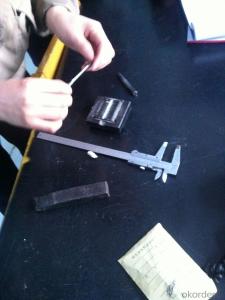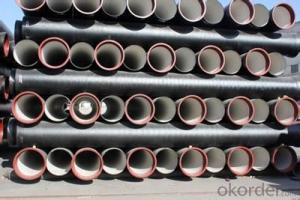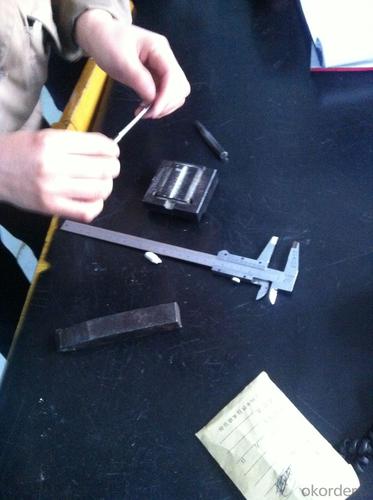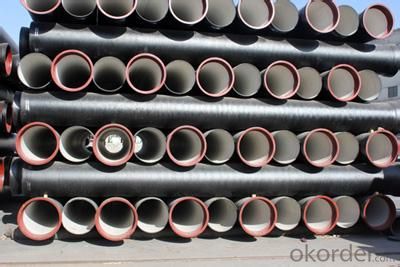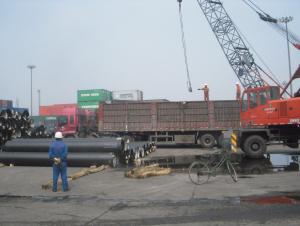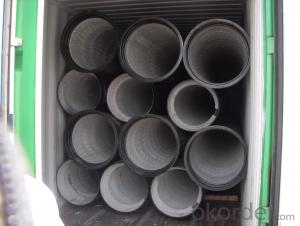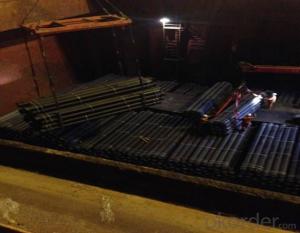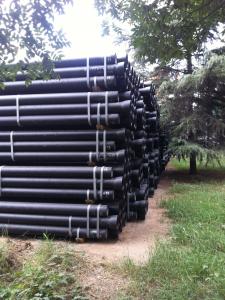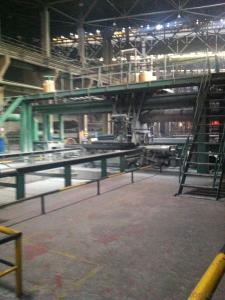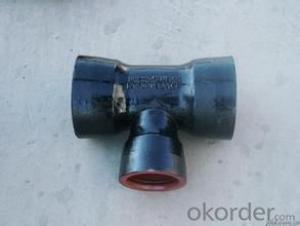DUCTILE IRON PIPE AND PIPE FITTINGS K8 CLASS DN300
- Loading Port:
- Tianjin
- Payment Terms:
- TT OR LC
- Min Order Qty:
- 23 pc
- Supply Capability:
- 3000 pc/month
OKorder Service Pledge
OKorder Financial Service
You Might Also Like
Material : Ductile Cast Iron
Size Range : DN 80mm to DN 2000mm
Unit Effective Length : 6m or 5.7m
Manufacture Standard: ISO 2531:1998/ EN 545:2006/EN 598:2007
Annual capacity : 200,000 tons
Coating Exterior: Zinc 130g/m2 according to ISO 8179-1 and bitumen coating 70 microns.
Cement Interior: Portland Cement/ High Alumina Cement/ Sulphate Resisting Cement Lining according to ISO 4179
Special requirements on external coating and internal lining can be applied
We also provide accessories such as SBR/EPDM rubber gaskets, lubricant paste, pipe caps, PE sleeves, etc.
Additional Parts:
Each pipe is strictly inspected according to related standard to ensure permanently high performance.
Easy Installation at site and service free for life
Long Service Lifespan
Quotation will arrive you within 24hours once we get your inquiry.
We guarantee offering you a competitive price.
A copy of original inspection reports of pipes will be offered after shipment.
Photos of loading process will be sent to the customer after shipment effect.
We will follow-up the delivery progress after shipment effect and update to the customer on weekly basis.
- Q: Can ductile iron pipes be used for mining applications?
- Mining applications can indeed utilize ductile iron pipes. These pipes possess exceptional mechanical properties, including high tensile strength, impact resistance, and durability. As a result, they are well-suited for a range of challenging environments, including mining operations. The pipes are capable of withstanding substantial loads and pressures, making them ideal for the transportation of water, slurry, and other fluids utilized in mining processes. Moreover, ductile iron pipes have a smooth internal surface that minimizes friction and promotes the efficient flow of materials. Consequently, they find extensive use in tasks such as dewatering, tailings disposal, and the transport of corrosive or abrasive substances within the mining industry. Overall, due to their strength, durability, and suitability for demanding conditions, ductile iron pipes offer a dependable and cost-effective choice for mining applications.
- Q: What new technologies are there for the installation of ductile iron pipes?
- Because the new flexible interface mechanism of cast iron drainage pipe pipe in the development of China's relatively short history, compared with other drainage pipes, people know little of the present, with some experience of the author in the construction, the application of the performance, characteristics and engineering, to do some simple introduction.
- Q: Does centrifugal cast iron pipe work well with lining cement? Will it scale and breed bacteria?
- From the centrifugal ductile cast iron pipe with cement production process to analysis, the most core pipe by centrifugal molding, concrete water cement ratio, the centrifugal force, the coarse aggregate to the outer wall of the pipe and the pipe inside; because of fine aggregate and water removal, strength and wear resistance variation. When the inner wall of the pipe by long-term washing and soaking water, and inner wall wear and erosion, as the roughness increases, head loss increases, you will need to increase the pump lift, and operation cost for power consumption increases, also greatly increased.
- Q: Can ductile iron pipes be used for water distribution networks?
- Yes, ductile iron pipes can be used for water distribution networks. Ductile iron pipes are highly durable, corrosion-resistant, and have a long lifespan, making them suitable for transporting water over long distances. Additionally, their flexible nature allows them to withstand ground movement and vibrations, making them a reliable choice for water distribution networks.
- Q: What are the different methods for tapping ductile iron pipe?
- Tapping ductile iron pipe can be done in several different ways, depending on the project's specific needs. Some commonly used methods include: 1. Mechanical Tapping: To create a hole in the ductile iron pipe, a mechanical tapping machine is employed. Equipped with a rotating cutting tool, the machine easily cuts through the pipe wall, resulting in a clean hole. This method is ideal for smaller diameter pipes and is both quick and efficient. 2. Hot Tapping: While the ductile iron pipe is still in service and under pressure, hot tapping involves creating a hole. To ensure safety and maintain the pipe's integrity, specialized equipment and expertise are required. Hot tapping is commonly used when shutting down the pipeline for maintenance or repair work is impractical or not feasible. 3. Electrofusion Tapping: For larger diameter pipes, electrofusion tapping is a suitable method. It involves using an electrofusion saddle and fitting to create a branch connection on the ductile iron pipe. By welding a fitting onto the pipe with an electrofusion machine, a secure and leak-proof connection is achieved. This method can be used for both water and gas applications. 4. Saddle Tapping: A cost-effective and simple method for smaller diameter pipes is saddle tapping. It involves attaching a saddle or clamp onto the ductile iron pipe and drilling a hole through it. The saddle is then equipped with a threaded outlet to connect a branch line. 5. Split Sleeve Tapping: For larger diameter pipes, split sleeve tapping is commonly used. This method requires cutting a section out of the ductile iron pipe and installing a split sleeve over the cut. By bolting the split sleeve together, a secure and watertight connection is established. It is suitable for both water and gas applications. When selecting the tapping method, it is crucial to consider factors like pipe size, pressure rating, required branch connection, and project-specific requirements. Consulting a professional engineer or tapping specialist is highly recommended to ensure the correct method is used for tapping ductile iron pipe.
- Q: Can ductile iron pipes be used in marine environments?
- Ductile iron pipes are suitable for marine environments due to their excellent mechanical properties, high corrosion resistance, and durability. These pipes are made of a type of cast iron known as ductile iron, which can withstand the harsh conditions of marine environments. Marine environments are known for their high levels of corrosion caused by saltwater, humidity, and other harsh factors. However, ductile iron pipes are specifically designed to endure these conditions. They have a protective layer called the "graphite skin" that acts as a barrier against corrosion. This graphite skin prevents rust formation and safeguards the pipes from degradation. Additionally, ductile iron pipes can be further protected with coatings or linings to enhance their corrosion resistance in marine environments. These protective coatings, such as epoxy, polyurethane, or zinc coatings, provide an extra layer of defense against corrosion. This ensures the pipes' longevity and reliability in marine environments. To maintain optimal performance, regular maintenance and inspection are crucial for ductile iron pipes in marine environments. This includes regular cleaning to remove marine growth or debris that may accumulate on the pipes and conducting routine inspections to identify any signs of corrosion or damage. In conclusion, ductile iron pipes are a suitable choice for marine environments. Their inherent corrosion resistance, durability, and the ability to apply additional protective coatings make them ideal for various marine applications.
- Q: Can ductile iron pipes be used for underground chemical processing systems?
- Ductile iron pipes are generally not recommended for use in underground chemical processing systems due to their limited resistance to corrosion from various chemicals. While ductile iron pipes are known for their strength, durability, and flexibility, they are still vulnerable to corrosion when exposed to certain chemicals, especially those with high acidity or alkalinity. In underground chemical processing systems, there is a higher risk of exposure to corrosive substances that can deteriorate the ductile iron pipes over time. This can lead to leaks, cracks, and failures in the piping system, compromising its integrity and potentially causing hazardous conditions. For underground chemical processing systems, it is advisable to consider alternative materials that are more resistant to corrosion, such as stainless steel, PVC, or high-density polyethylene (HDPE) pipes. These materials offer superior chemical resistance and can withstand the harsh conditions typically present in chemical processing environments. It is crucial to consult with experts in chemical engineering, piping design, and corrosion resistance to determine the most suitable materials for underground chemical processing systems. Proper material selection is vital to ensure the longevity and safety of the piping infrastructure in such environments.
- Q: How are ductile iron pipes protected against stray electrical currents?
- Ductile iron pipes, which are commonly used for water and sewer systems, are protected against stray electrical currents through a process known as cathodic protection. This method involves applying a low-voltage direct current (DC) to the pipes, which creates a protective electrical field around them. Cathodic protection is achieved by installing sacrificial anodes or impressed current systems near the ductile iron pipes. Sacrificial anodes, typically made of a more electrically active metal such as zinc or magnesium, are connected to the pipes and serve as the source of electrical current. These anodes corrode over time, sacrificing themselves to protect the pipes from corrosion due to stray electrical currents. Impressed current systems, on the other hand, utilize an external power source to supply the protective electrical current. Rectifiers are used to convert alternating current (AC) to direct current (DC) and the DC is then applied to the pipes through anodes. This method allows for more control over the amount of current being applied, ensuring optimal protection. In both cases, the electrical current flowing through the sacrificial anodes or impressed current systems creates a protective barrier around the ductile iron pipes. This barrier prevents the stray electrical currents from flowing through the pipes, reducing the risk of corrosion and extending the lifespan of the infrastructure. Regular monitoring and maintenance of the cathodic protection system are essential to ensure its effectiveness. This involves inspecting the anodes, checking the electrical current levels, and making any necessary adjustments or replacements to maintain the desired level of protection. Overall, cathodic protection is a reliable and widely used method to protect ductile iron pipes against stray electrical currents, safeguarding the integrity and longevity of water and sewer systems.
- Q: How does ductile iron pipe perform in extreme weather conditions?
- Ductile iron pipes are known for their exceptional performance in extreme weather conditions. These pipes exhibit a high level of durability, resistance, and flexibility, making them suitable for withstanding harsh weather conditions such as extreme temperatures, heavy rain, snow, and even earthquakes. One of the key attributes of ductile iron is its ability to resist damage from freezing temperatures. Unlike other materials, ductile iron pipes have a low coefficient of thermal expansion, enabling them to withstand the expansion and contraction that occurs during freeze-thaw cycles without cracking or breaking. This ensures the pipes remain intact and continue to perform optimally even in frigid conditions. Additionally, ductile iron pipes have excellent corrosion resistance, making them highly resilient against the corrosive effects of extreme weather. They are protected by a durable zinc coating, which acts as a barrier against rust and other forms of corrosion. This coating, combined with the inherent strength of ductile iron, makes these pipes highly resistant to the corrosive effects of rain, snow, and moisture. Moreover, ductile iron pipes possess superior flexibility, allowing them to accommodate ground movement and seismic activity. In regions prone to earthquakes or shifting soil, these pipes can absorb the stress and strain without fracturing, ensuring continuous water supply and sewerage services even in the most challenging weather conditions. Overall, ductile iron pipes excel in extreme weather conditions due to their durability, resistance to freezing, corrosion, and flexibility. Their ability to withstand the elements ensures uninterrupted water supply and sewage systems, providing reliability and peace of mind to utilities and communities even in the harshest environments.
- Q: What is the weight of a typical ductile iron pipe?
- The weight of a typical ductile iron pipe can vary depending on size and wall thickness. Ductile iron pipes are generally available in sizes ranging from 3 inches to 64 inches in diameter. The weight of these pipes can range from a few pounds per foot for smaller sizes to several hundred pounds per foot for larger diameters. Additionally, wall thickness plays a significant role in determining the weight of the pipe. Thicker walls will result in a heavier pipe. For example, a 10-inch ductile iron pipe with a wall thickness of 0.25 inches may weigh around 26 pounds per foot, while a 24-inch ductile iron pipe with a wall thickness of 0.5 inches can weigh approximately 175 pounds per foot. To determine the precise weight of a specific ductile iron pipe, it is essential to consult specific manufacturer specifications or engineering references.
Send your message to us
DUCTILE IRON PIPE AND PIPE FITTINGS K8 CLASS DN300
- Loading Port:
- Tianjin
- Payment Terms:
- TT OR LC
- Min Order Qty:
- 23 pc
- Supply Capability:
- 3000 pc/month
OKorder Service Pledge
OKorder Financial Service
Similar products
Hot products
Hot Searches
Related keywords
